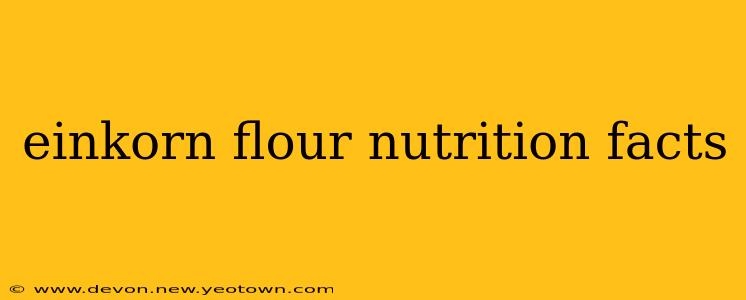Einkorn, often hailed as an "ancient grain," has surged in popularity, captivating health-conscious individuals seeking nutritious alternatives to modern wheat. But what exactly makes einkorn flour so special? Let's delve into the nutritional powerhouse that is einkorn flour and explore its unique characteristics. Our journey begins with a look at its nutritional profile, then we'll uncover some frequently asked questions surrounding this fascinating flour.
What are the Nutritional Benefits of Einkorn Flour?
Imagine a time before modern wheat varieties, a time when einkorn was one of the few wheat types available. This ancient grain boasts a nutritional profile distinct from its modern counterparts. It's packed with nutrients often lacking in refined grains, making it a valuable addition to a balanced diet. Einkorn flour is a good source of protein, fiber, and several essential minerals, setting it apart from many modern wheat varieties. This rich nutritional profile contributes to its rising popularity amongst health-conscious consumers. The fiber content, in particular, aids in digestion and promotes a feeling of fullness, potentially assisting with weight management.
How Does Einkorn Flour Compare to Other Flours?
This is where the story gets truly interesting. Unlike modern wheat varieties, einkorn hasn’t undergone extensive genetic modification. This means it retains a genetic structure closer to its ancestral form. This results in a different nutritional composition, particularly when compared to modern wheat flours like all-purpose or bread flour. Einkorn generally boasts a higher protein content, more fiber, and a richer array of micronutrients. However, it's important to remember that the exact nutritional content can vary depending on factors like growing conditions and processing methods. Comparing einkorn flour to other whole grain options like spelt or rye flour reveals a similar nutritional density, all offering distinct flavors and textures.
Is Einkorn Flour Gluten-Free?
This is a common question, and the answer requires careful consideration. While einkorn is an ancient wheat, it does contain gluten. Those with celiac disease or severe gluten intolerance must strictly avoid einkorn flour. However, some individuals with non-celiac gluten sensitivity may find einkorn easier to digest than modern wheat varieties due to its unique protein structure. This is often attributed to the lower levels of certain gluten proteins. Always consult with a healthcare professional or registered dietitian before incorporating einkorn into your diet if you have any gluten sensitivities.
What are the Potential Health Benefits of Einkorn Flour?
The rich nutritional profile of einkorn flour leads to several potential health benefits. The high fiber content can improve digestive health and regulate blood sugar levels. The presence of various minerals contributes to overall well-being. Some studies suggest that einkorn may have a lower glycemic index compared to modern wheat, potentially making it a better choice for individuals managing blood sugar. However, more research is needed to fully understand the extent of these potential health benefits. It's crucial to remember that while einkorn flour offers several potential advantages, it should be part of a balanced diet rather than a stand-alone solution for health problems.
What are the Differences Between Einkorn and Spelt Flour?
Both einkorn and spelt are ancient grains, but they are distinct. Einkorn is a diploid wheat, meaning it has two sets of chromosomes, while spelt is a hexaploid wheat with six sets. This difference in genetic structure influences their protein content and gluten characteristics. Spelt generally has a higher gluten content than einkorn, resulting in a chewier texture when baked. While both are nutritious, einkorn is often favored for its purported easier digestibility for those with sensitivities to gluten. The choice between einkorn and spelt often comes down to personal preference and the desired texture in baked goods.
How Can I Incorporate Einkorn Flour into My Diet?
Incorporating einkorn flour into your diet is surprisingly easy! You can substitute it for a portion of all-purpose flour in many recipes. Start with a smaller substitution (e.g., replacing 25% of the all-purpose flour with einkorn) to gauge its effect on the texture of your baked goods. It works well in bread, muffins, pancakes, and even pasta. Experiment with different ratios to find your preferred consistency. The slightly nutty flavor of einkorn adds a unique touch to various dishes. Remember to adjust liquid amounts as needed, as einkorn flour can absorb more liquid than all-purpose flour.
This journey through the world of einkorn flour highlights its nutritional prowess and unique characteristics. Remember, dietary choices are deeply personal, and consulting with a healthcare professional is always advisable before making significant dietary changes. The information provided here is for educational purposes and should not be considered medical advice.

